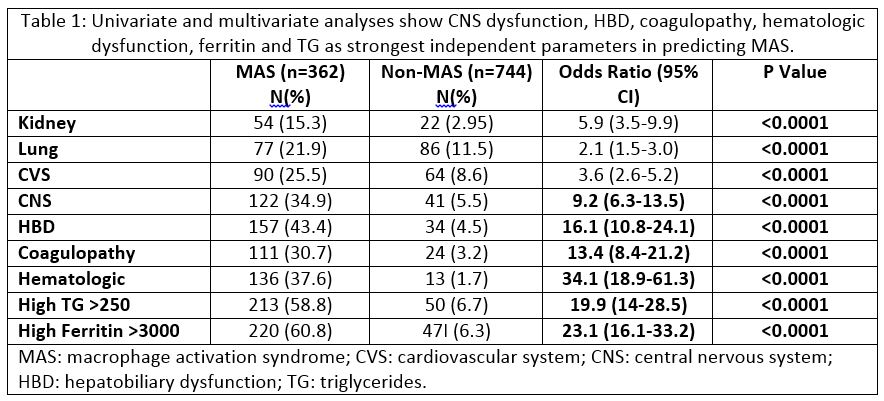Session Information
Date: Monday, November 9, 2015
Session Type: ACR Poster Session B
Session Time: 9:00AM-11:00AM
Background/Purpose:
Early recognition and treatment of Macrophage Activating
Syndrome (MAS) can improve outcome. Various diagnostic criteria are available
to optimize the diagnosis if suspected by the treating physicians. However, low
index of suspicion and the non-specific nature of the criteria can present a
barrier to prompt and early recognition. This study utilizes an established MAS
dataset in a cohort of systemic juvenile idiopathic arthritis (sJIA) patients to determine organ based predictors of MAS
by admitting physicians for early recognition.
Methods:
The data from international multicenter cohort of MAS (Minoia et. al. Arthritis Rheumatol. 2014; 66:3160-9) was used. Retrospective data was collected from
95 investigators in 33 countries, including 362 patients with sJIA with MAS, 404 patients with active sJIA
without MAS, and 345 patients with systemic infection. The dataset included
demographics, clinical, laboratory, and histopathological variables. Data
describing dysfunction in heart, lung, and kidney function; elevations in serum
ferritin and triglyceride (TG) levels were defined as > 3,000 ng/dL, and 250 mg/dL, respectively. Other
organ dysfunctions were defined as below:
·
Coagulopathy:
fibrinogen level <100 mg/dL, platelet count
<40,000 /mm3, d-dimers >2-times the upper normal value.
·
Hepatobiliary dysfunction (HBD): liver enzyme elevation at least 3-times the
upper normal value or bilirubin > 5.8 mg/dL.
·
Hematological dysfunction: counts below normal limits, or 50% reduction
in hemoglobin or leukocytes.
Univariate and multivariate statistical analyses were performed
to identify correlates of MAS, and entered into a logistic regression model to
assess independent predictors of MAS.
Results:
A total of 1,111 patients
were included. Despite the statistically significant association in Univariate
analysis, logistic regression did not identify a meaningful association with kidney,
lung, or cardiovascular system (CVS) dysfunction (Table-1). Six independent
parameters strongly correlates with MAS includes: central nervous system
dysfunction (CNS), HBD dysfunction, coagulopathy, hematologic dysfunction,
elevated ferritin and TG. Presence of 2 out of these 6 parameters was
considered suggestive of MAS and 3 out of these 6 parameters was found to be
confirmatory.
Conclusion:
MAS is associated with dysfunctional reticuloendothelial
clearance, manifesting as CNS, hematologic, hepatobiliary, and coagulation
dysfunction, with high levels of ferritin and TG. Presence of MAS should be suspected when at
least 2 of the 6 parameters are noted, which should prompt further
investigation and early identification.
To cite this abstract in AMA style:
Goh KS, Minoia F, Ravelli A, Cron RQ, Shakoory B. An Organ Based Diagnostic Approach to Macrophage Activating Syndrome in Children Demonstrates Impaired Reticuloendothelial System Clearance [abstract]. Arthritis Rheumatol. 2015; 67 (suppl 10). https://acrabstracts.org/abstract/an-organ-based-diagnostic-approach-to-macrophage-activating-syndrome-in-children-demonstrates-impaired-reticuloendothelial-system-clearance/. Accessed .« Back to 2015 ACR/ARHP Annual Meeting
ACR Meeting Abstracts - https://acrabstracts.org/abstract/an-organ-based-diagnostic-approach-to-macrophage-activating-syndrome-in-children-demonstrates-impaired-reticuloendothelial-system-clearance/


